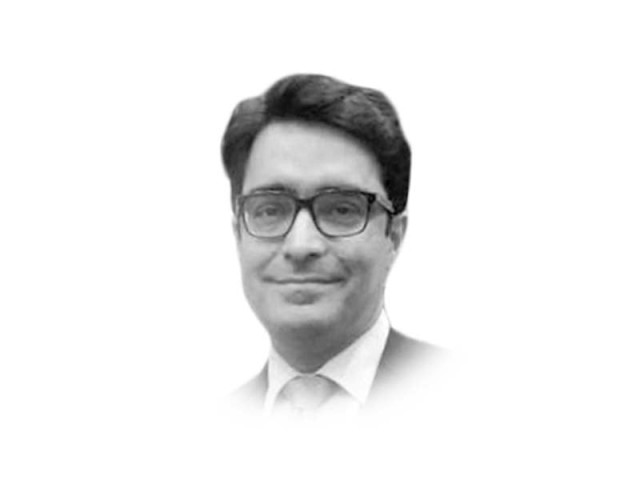Need for revamp and reform
An efficient and accountable police can ensure protection of life, liberty and property

The writer is a member of the Police Service of Pakistan and has studied public policy at Syracuse University. He tweets @umarriaz40
The ideal state is thus not a police state but a policed state. A policed state is a polity where the police ensure a threat-free living and that too without excesses of the power. Is our police living up to that? The perception as well as facts indicate otherwise. Our police is blamed to be inefficient as well as exploitative. The inefficiency is reflected in failure to entertain complaints, to curb crime, to punish criminals and to compensate the victims. The exploitation is reflected in corruption, high-handedness and violence. Since the police or law and order are provincial subjects so the problem is easier to locate. K-P and G-B stand out as receptive and accommodating while Punjab and Sindh faring in more negative light.
And then Punjab is more crucial and challenging. While it constitutes around fifty per cent of population, it counts for more than sixty per cent of recorded crime especially crime against property and crimes related to financial transactions. As per data from the National Police Bureau, in 2016, out of 12,875 recorded robberies, 9,909 were reported in Punjab. The figures are also consistent regarding motor vehicle hijacking and cattle thefts, etc. The high incidence is mainly because of prevalence of urban centers, economic activity and rural-urban migration. The situation becomes more precarious when it comes to investigation and punishments. A blame game also ensues amongst but police performance on this front leaves much to be desired. The citizens however lament less for inefficiency and more for brutality. An interaction with an ordinary cop on streets is never without complaints. The complaints of indifference which then takes the form of denial of service, corruption which takes the form of extortion, and rudeness which often become torture. So what is the solution?
Police reform is the answer. Reforms however mean different to different people. The reforms in public services revolve more around service providers and less around the public. The response of bureaucracies to reform is always in having more bureaucracy. The police is no exception. More resources are demanded as is more authority. The other stakeholders, including politicians and the secretariat, invariably remain skeptical of these and come up with the requirements suiting them. Then there is issue of reform design. How much to change and how to go about that? The distinction between restructuring and reforms also gets muddled. More often, the reforms turn more towards optics and less towards substance. This happens more out of compulsion and less by intention. There is always thus a risk of being diverted, distracted and lost.
A focused effort is the one that does not lose sight of the basics. It is ultimately about efficiency and attitudes. These two prongs should form the foundation of any reform effort. Police performance is conditional about professionalism which can only come from specialisation and specialisation can only come from training and work environment. Then there is quest for optimal delivery unit. The law and system revolves around police station but police station is essentially a rural phenomenon and is mostly ill-equipped and out-dated. The urban policing model necessitates moving beyond. A 2017 policy note on public safety problem in Lahore by IDEAS (Institute of Development and Economic Alternatives) showed exponential rise of crime rate (125 to 325 per 100,000) during the last 25 years from 1990 to 2015 in Punjab. The survey also predictably found the citizens’ trust level in the police at just 25 per cent. A similar trend will be found in other major urban centers like Faisalabad, Multan, Rawalpindi and Gujranwala. A new urban policing model consisting of professional police unit cannot wait any longer.
The second prong is that of accountability. The accountability of not just the performance but of conduct as well. The electronic and social media have already shaped the discourse, which is now more about public dealing and less about recoveries and figures. The police department is one of the most punishing departments but it is also the most forgiving. The terms ‘police culture’ or ‘thana culture’ refuse to fade away despite so many efforts. Then there is purported trade-off between performance and high-handedness. The most difficult of any organisational changes is the cultural change but 70 years should have been enough to move beyond the constabulary model. Now is the time for accountability model. accountability has to be at all levels; internal as well as external, and horizontal as well as vertical.
The experience in Khyber-Pakhtunkhwa has established that a turnaround is possible with political will, autonomy and planning. The K-P Police Act encapsulated the spirit of Police Order 2002 which itself was the only and comprehensive attempt at police reforms. Many of the proposed measures remained unfinished and with the passage of time, fresh ones need to be added. The Punjab challenge is however bigger in magnitude as well as the target issues are concerned but there cannot be more opportune time to embark on this quest. An efficient and accountable police can ensure protection of life, liberty and property provided the delivery mechanisms of professionalism and answerability are put in place.
Published in The Express Tribune, October 5th, 2018.
Like Opinion & Editorial on Facebook, follow @ETOpEd on Twitter to receive all updates on all our daily pieces.














COMMENTS
Comments are moderated and generally will be posted if they are on-topic and not abusive.
For more information, please see our Comments FAQ